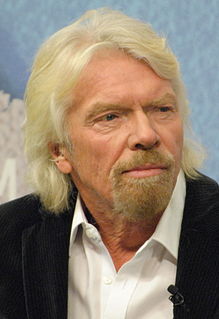A Quote by Hélder Câmara
In the developed countries of the capitalist world, the mass media are beginning to become businesses, and huge businesses at that. The freedom of journalists is now becoming, in most cases, a very relative thing: it ends where the interests of the business begin... In socialist areas, it is enough to recall that the means of social communication are the monopoly of the party.
Related Quotes
Business is the most powerful force in society. It has the highest potential for solving social problems. Once consumers saw examples of prosperous companies integrating social concerns into their business practices, they were emboldened to demand the same of other businesses. Businesses could no longer say it was impossible.
Corporations that are turning over these huge profits can own everything: the media, the universities, the mines, the weapons industry, insurance hospitals, drug companies, non-governmental organisations. They can buy judges, journalists, politicians, publishing houses, television stations, bookshops and even activists. This kind of monopoly, this cross-ownership of businesses, has to stop.
...the mass media. What are they? They're huge corporations, massive corporations, linked up with even bigger corporations. They sell audiences to other businesses, namely advertisers. So when you turn on the television set, CBS doesn't make any money. They make money from the advertisers. You're the product that they're selling, and the same is true of the daily newspaper. They're huge corporations, selling audiences, potential consumers, to other businesses, all linked up closely to the government, especially the big media. What picture of the world do you expect them to present?
I've always been business-minded. I worked in corporate America before becoming an actress and knew that acting wasn't the end but a means to an end. It gave me the platform and the exposure I needed to do my philanthropic work. It also gave me the financial security to focus on my other businesses, start new businesses, and even help other people start businesses.
I’d say that Berkshire Hathaway’s system is adapting to the nature of the investment problem as it really is. We’ve really made the money out of high quality businesses. In some cases, we bought the whole business. And in some cases, we just bought a big block of stock. But when you analyze what happened, the big money’s been made in the high quality businesses. And most of the other people who’ve made a lot of money have done so in high quality businesses.
A considerable proportion of the developed world's prosperity rests on paying the lowest possible prices for the poor countries' primary products and on exporting high-cost capital and finished goods to those countries. Continuation of this kind of prosperity requires continuation of the relative gap between developed and underdeveloped countries - it means keeping poor people poor. Increasingly, the impoverished masses are understanding that the prosperity of the developed countries and of the privileged minorities in their own countries is founded on their poverty.
While Washington pays lip service to the challenges facing small businesses, it repeatedly chooses its own expansion over results. In effect, government has become a huge silent partner in all businesses, often taking a majority of the profits and forcing many unprofitable business decisions without the risk that it will be fired.
Between the Great Depression and the 1970s, private business was viewed with suspicion even in most capitalist economies. Businesses were, so the story goes, seen as anti-social agents whose profit-seeking needed to be restrained for other, supposedly loftier, goals, such as justice, social harmony, protection of the weak and even national glory.
On the world scene, it is our position that there is a resurgence of socialism taking place. The world's socialist and Communist forces are now on the move to restore socialism in the former socialist countries and to strengthen the existing socialist countries... there is a new socialist world on the horizon, a resurgence of the world revolutionary process.

































